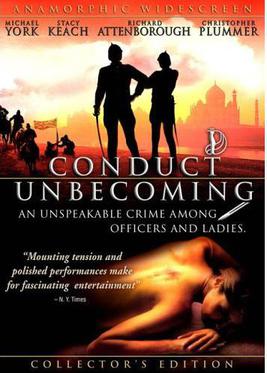Introduction:
In the realm of cinematic treasures, “Conduct Unbecoming” (1975) emerges as a compelling drama that unfolds against the backdrop of British colonial India. Directed by Michael Anderson and based on the play by Barry England, this thought-provoking film delves into the complexities of honor, prejudice, and military justice. As we embark on a journey through the intricacies of this courtroom drama, we discover the timeless relevance of its themes and the power of its performances.
Plot Summary:
Set in 1880s British India, “Conduct Unbecoming” centers around an infantry regiment stationed in the colonial outpost of Bengal. The narrative follows the arrival of a young officer, Lieutenant Drake (played by Michael York), who becomes embroiled in a scandalous incident involving the alleged assault of Mrs. Scarlett (played by Susannah York), a woman of the Anglo-Indian community. As the accusation unfolds, the regiment finds itself entangled in a web of honor, pride, and the strict code of military conduct.
The focus of the film shifts to the subsequent court-martial proceedings, where Lieutenant Drake faces charges of conduct unbecoming an officer and a gentleman. The courtroom becomes a battleground where questions of integrity, loyalty, and the prevailing social order clash, exposing the fault lines within the regiment and the broader colonial society.
Cinematic Brilliance:
- Compelling Ensemble Cast: “Conduct Unbecoming” boasts a stellar ensemble cast, with Michael York delivering a nuanced portrayal of Lieutenant Drake. The film features a distinguished lineup of actors, including Richard Attenborough, Trevor Howard, Stacy Keach, and Christopher Plummer, each contributing to the depth and authenticity of their respective characters. The ensemble’s chemistry enhances the film’s impact, creating a believable portrayal of the social dynamics within the regiment.
- Cinematic Realization of Colonial India: Michael Anderson’s direction, coupled with the evocative cinematography by Gerry Turpin, brings colonial India to life on the screen. The film captures the vibrant yet oppressive atmosphere of British India, with detailed set designs and costumes that transport the audience to a bygone era. The juxtaposition of military discipline and the exotic backdrop adds layers to the storytelling.
- Exploration of Social Prejudice: At its core, “Conduct Unbecoming” delves into the prevailing social prejudices of its time. The film addresses issues of class, race, and gender within the rigid structure of British colonial society. The tension between the British officers and the Anglo-Indian community reflects the broader societal prejudices that influenced the dynamics of the era.
- Courtroom Drama Intensity: The courtroom sequences in “Conduct Unbecoming” are a masterclass in building tension and drama. The trial becomes a microcosm of the societal conflicts, as the characters grapple with notions of honor, duty, and justice. The film skillfully uses the trial setting to unravel the layers of the characters’ motivations and the consequences of their actions.
- Nuanced Exploration of Honor: The concept of honor takes center stage in the narrative, driving the characters’ decisions and actions. “Conduct Unbecoming” explores the multifaceted nature of honor – from individual integrity to the regimental code – and challenges the characters and the audience to question the price of maintaining one’s honor within the confines of a rigid social structure.
- Stirring Musical Score: Carl Davis’s evocative musical score adds depth and emotion to the film. The score enhances the atmospheric quality of the narrative, underscoring the emotional beats and heightening the impact of critical moments. Davis’s contribution enriches the viewing experience, complementing the film’s visual and thematic elements.
Legacy and Impact:
While “Conduct Unbecoming” may not be as widely celebrated as some of its contemporaries, its enduring impact lies in its unflinching exploration of societal prejudices, honor, and justice. The film resonates with audiences who appreciate thought-provoking narratives that challenge established norms and confront the complexities of human behavior.
The themes addressed in “Conduct Unbecoming” continue to hold relevance, prompting reflection on issues of honor, justice, and the societal structures that shape individual choices. The film’s legacy extends beyond its initial release, finding a place in the discourse on cinematic portrayals of colonial history and the enduring impact of systemic prejudices.
Conclusion:
As we reflect on “Conduct Unbecoming” (1975), we are transported to a pivotal moment in British colonial history, where honor, pride, and societal prejudices collide. Michael Anderson’s directorial vision, coupled with a stellar ensemble cast and a captivating narrative, creates a film that remains a testament to the power of storytelling and its ability to provoke introspection.
The enduring allure of “Conduct Unbecoming” lies in its ability to transcend its historical setting, offering audiences a mirror to examine their own notions of honor and justice. The film’s exploration of societal prejudices serves as a reminder of the complexities that underlie human interactions, challenging viewers to confront uncomfortable truths and question established norms. In the pantheon of thought-provoking cinema, “Conduct Unbecoming” stands tall, inviting audiences to grapple with the timeless questions it poses about honor, justice, and the conduct deemed acceptable within the confines of society.
